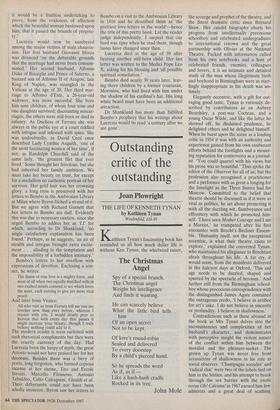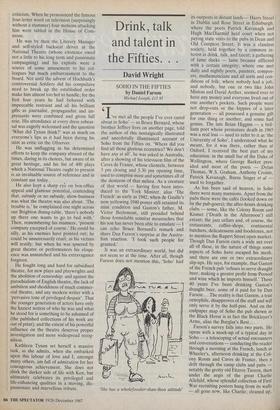Outstanding critic of the outstanding
Joan Plowright
THE LIFE OF KENNETH TYNAN by Kathleen Tynan
Weidenfeld, £16.95
Kathleen Tynan's fascinating book has reminded us all how much duller life is without Ken Tynan, the whirlwind raiser, the scourge and prophet of the theatre, and the finest dramatic critic since Bernard Shaw. Her candid biography charts his progress from intellectually precocious schoolboy and celebrated undergraduate to international renown and the great partnership with Olivier at the National Theatre. Packed with information culled from his own notebooks and a host of celebrated friends, enemies, colleagues and lovers, it is an intimate and detailed study of the man whose illegitimate birth and boyhood in Birmingham were as start- lingly inappropriate as his death was un- timely.
Elegantly eccentric, with a gift for out- raging good taste, Tynan is variously de- scribed by contributors as an Aubrey Beardsley, a post-war Cocteau, and a young Oscar Wilde; and like the latter he showed off, he disdained prudence, he delighted others and he delighted himself. When he burst upon the scene as a leading critic in 1954 it was with an authority and experience gained from his own exuberant efforts behind the footlights and a mount- ing reputation for controversy as a journal- ist. 'You could quarrel with his views but his prose was so beautiful.' Thus spoke the editor of the Observer for all of us; but the profession also recognised a practitioner and a performer with as great a longing for the limelight as the Three Sisters had for Moscow. Committed to the belief that theatre should be discussed as if it were as vital as politics, he set about promoting it with all the dazzling wit, flamboyance and effrontery with which he promoted him- self. 'I have seen Mother Courage and I am a Marxist,' he trumpeted after his first encounter with Brecht's Berliner Ensem- ble. 'Humanity itself, not the exceptional eccentric, is what their theatre exists to explore,' explained the converted Tynan, who maintained his allegiance to Brechtian ideals throughout his life. A far cry, it would seem, from the manifesto delivered in the halcyon days at Oxford, 'This sad age needs to be dazzled, shaped and spurred by the spectacle of heroism.' And further still from the Birmingham school- boy whose precocious correspondence with the distinguished James Agate contained the outrageous credo, 'I believe in artifice for art's sake. I do not believe in sincerity or profundity. I believe in shallowness.'
Contradictions such as these abound in the book as Mrs Tynan delves into the inconsistencies and complexities of her husband's character, and demonstrates with perceptive insight the violent nature of the conflict within him between the moralist and the pleasure-seeker. The grown up Tynan was never free from accusations of shallowness in his role as social observer. 'Champagne socialist' and `radical chic' were two of the labels tied on him in the Sixties: and his attempt to break through the sex barrier with the erotic revue Oh! Calcutta! in 1967 earned him few admirers and a great deal of scathing criticism. When he pronounced the famous four-letter word on television (surprisingly without a stammer) four motions attacking him were tabled in the House of Com- mons.
He was by then the Literary Manager and self-styled backseat driver at the National Theatre (whose existence owed not a little to his long term and passionate campaigning) and his exploits were a source of some amusement to his col- leagues but much embarrassment to the board. Not until the advent of Hochhuth's controversial Soldiers did his compulsive need to break up the established order make him almost too hot to handle; for the first four years he had behaved with impeccable restraint and all his brilliant gifts as journalist, propagandist and im- pressario were combined and given full rein. His attendance at every dress rehear- sal was eagerly welcomed and the question 'What did Tynan think?' was as much on everyone's lips as it had been during his stint as critic on the Observer.
He was unflagging in his determined efforts to keep the company abreast of the times, daring in its choices, but aware of its great heritage, and his list of 400 plays which a National Theatre ought to present is an invaluable source of reference and in constant use today. He also kept a sharp eye on box-office appeal and glamour potential, contending that, subsidy or no subsidy, show-business was what the theatre was also about. 'The trouble is,' he complained one night across our Brighton dining-table, 'there's nobody up there one wants to go to bed with.' Then, remembering his manners, 'present company excepted of course.' He could be silly, as his enemies have pointed out; he could be unnecessarily cruel, as his victims will testify: but when he was spurred by great theatre or performances his eloqu- ence was unmatched and his extravagance forgiven.
He fought long and hard for subsidised theatre, for new plays and playwrights and the abolition of censorship: and against the parochialism of English theatre, the lack of ambition and shoddiness of much commer- cial theatre, and any modern writer with a 'pervasive tone of privileged despair'. That the younger generation of actors have only the haziest notion of who he was and what he stood for is something to be ashamed of (the published collections of his work are out of print); and the extent of his powerful influence on the theatre deserves proper investigation and more widespread recog- nition.
Kathleen Tynan set herself a massive task, as she admits, when she embarked upon this labour of love and I, amongst many others, am full of admiration for her courageous achievement. She does not shirk the darker side of life with Ken, but ultimately celebrates its privileged and life-enhancing qualities in a moving, dis- passionate and marvellous tribute.











































































































 Previous page
Previous page